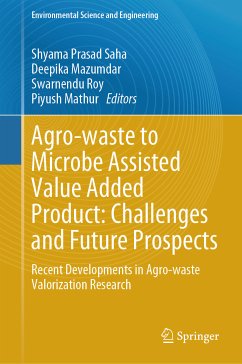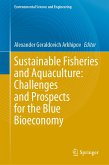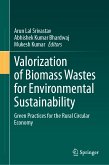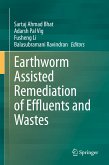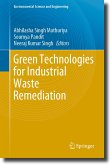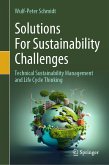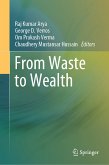Agro-waste to Microbe Assisted Value Added Product: Challenges and Future Prospects (eBook, PDF)
Recent Developments in Agro-waste Valorization Research
Redaktion: Saha, Shyama Prasad; Mathur, Piyush; Roy, Swarnendu; Mazumdar, Deepika


Alle Infos zum eBook verschenken

Agro-waste to Microbe Assisted Value Added Product: Challenges and Future Prospects (eBook, PDF)
Recent Developments in Agro-waste Valorization Research
Redaktion: Saha, Shyama Prasad; Mathur, Piyush; Roy, Swarnendu; Mazumdar, Deepika
- Format: PDF
- Merkliste
- Auf die Merkliste
- Bewerten Bewerten
- Teilen
- Produkt teilen
- Produkterinnerung
- Produkterinnerung

Hier können Sie sich einloggen

Bitte loggen Sie sich zunächst in Ihr Kundenkonto ein oder registrieren Sie sich bei bücher.de, um das eBook-Abo tolino select nutzen zu können.
This book mainly focuses on the recent trends and sustainability challenges in the valorization of agro-wastes, emphasizing the role of microbial biotechnology. Processing of various kinds of agro-wastes such as lignocellulosic materials, food industry wastes, dairy wastes, etc., into several bioactive compounds, enzymes, biofuels, biogas, biofertilizers, nutraceuticals, nanoparticles, etc., will be discussed elaborately in more detail. This book investigates the theoretical and practical aspects of modern research regarding the valorization of agro-wastes through microbial technology.…mehr
- Geräte: PC
- ohne Kopierschutz
- eBook Hilfe
- Größe: 9.89MB
![Sustainable Fisheries and Aquaculture: Challenges and Prospects for the Blue Bioeconomy (eBook, PDF) Sustainable Fisheries and Aquaculture: Challenges and Prospects for the Blue Bioeconomy (eBook, PDF)]() Sustainable Fisheries and Aquaculture: Challenges and Prospects for the Blue Bioeconomy (eBook, PDF)113,95 €
Sustainable Fisheries and Aquaculture: Challenges and Prospects for the Blue Bioeconomy (eBook, PDF)113,95 €![Valorization of Biomass Wastes for Environmental Sustainability (eBook, PDF) Valorization of Biomass Wastes for Environmental Sustainability (eBook, PDF)]() Valorization of Biomass Wastes for Environmental Sustainability (eBook, PDF)113,95 €
Valorization of Biomass Wastes for Environmental Sustainability (eBook, PDF)113,95 €![Earthworm Assisted Remediation of Effluents and Wastes (eBook, PDF) Earthworm Assisted Remediation of Effluents and Wastes (eBook, PDF)]() Earthworm Assisted Remediation of Effluents and Wastes (eBook, PDF)113,95 €
Earthworm Assisted Remediation of Effluents and Wastes (eBook, PDF)113,95 €![Energy and Environmental Challenges to Security (eBook, PDF) Energy and Environmental Challenges to Security (eBook, PDF)]() Energy and Environmental Challenges to Security (eBook, PDF)233,95 €
Energy and Environmental Challenges to Security (eBook, PDF)233,95 €![Green Technologies for Industrial Waste Remediation (eBook, PDF) Green Technologies for Industrial Waste Remediation (eBook, PDF)]() Green Technologies for Industrial Waste Remediation (eBook, PDF)113,95 €
Green Technologies for Industrial Waste Remediation (eBook, PDF)113,95 €![Solutions For Sustainability Challenges (eBook, PDF) Solutions For Sustainability Challenges (eBook, PDF)]() Wulf-Peter SchmidtSolutions For Sustainability Challenges (eBook, PDF)89,95 €
Wulf-Peter SchmidtSolutions For Sustainability Challenges (eBook, PDF)89,95 €![From Waste to Wealth (eBook, PDF) From Waste to Wealth (eBook, PDF)]() From Waste to Wealth (eBook, PDF)161,95 €
From Waste to Wealth (eBook, PDF)161,95 €-
-
-
Dieser Download kann aus rechtlichen Gründen nur mit Rechnungsadresse in A, B, BG, CY, CZ, D, DK, EW, E, FIN, F, GR, HR, H, IRL, I, LT, L, LR, M, NL, PL, P, R, S, SLO, SK ausgeliefert werden.
- Produktdetails
- Verlag: Springer Nature Switzerland
- Seitenzahl: 412
- Erscheinungstermin: 31. Mai 2024
- Englisch
- ISBN-13: 9783031580253
- Artikelnr.: 70882519
- Verlag: Springer Nature Switzerland
- Seitenzahl: 412
- Erscheinungstermin: 31. Mai 2024
- Englisch
- ISBN-13: 9783031580253
- Artikelnr.: 70882519
- Herstellerkennzeichnung Die Herstellerinformationen sind derzeit nicht verfügbar.
